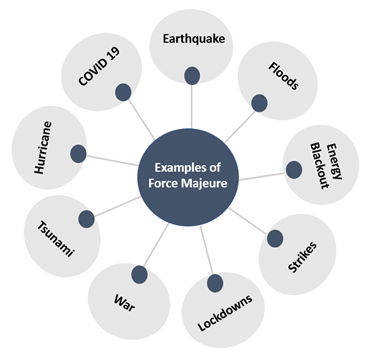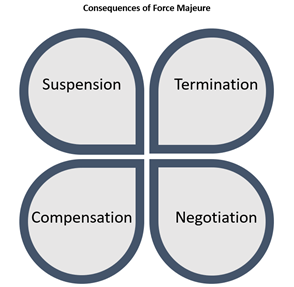What is Force Majeure?
“Force Majeure” is originated from a French word which implies “Superior Force” and is usually employed in English in its original type.
In the business context, Force Majeure is described as an unavoidable situation, which has risen due to any uncontrollable event, not led by any of the parties resulting in non-execution of a regular business, as per the agreement terms.
A Force Majeure provision in an agreement, permitting a party bounded in the agreement, to suspend or end the accomplishment of its commitments when certain conditions beyond its control have arisen, making the execution impracticable. The provision states that the agreement is automatically suspended on a temporary basis. Typical enforcement of the Force Majeure provision in a contract may take place in the events like any natural calamity, an act of government action, or any other inevitable situation, prohibiting any of the parties for the execution of the terms of the contract.

Image Source: Kalkine Image
Why is Force Majeure Important?
An organisation can incorporate a Force Majeure clause into a contract or an agreement to make parties free from any liability, if any of or both of them, fail to fulfil the terms and conditions of the signed contract or agreement.
Consequences of calling Force Majeure:
In most of the cases after claiming Force Majeure, it has been observed that the contract gets suspended or terminated. However, it mainly depends on the terms of the agreement. Sometimes, a party can also face compensation or negotiation.

Image Source: Kalkine Image
Suspension:
This is the most common consequence observed after the enforcement of a Force Majeure provision. On application, the rights and obligations of both parties get "Suspended" until the event lasts. This provides an extra relaxed time to the affected party to cope up until the effect of an unfavourable situation lasts, and has an impact, on the performance of the affected party.
Termination:
Depending on the terms of the contract, automatic termination of the deal after a stipulated span of time, may take place as a consequence of claiming Force Majeure provision. The parties must comply with the terms of termination.
Compensation:
In more extraordinary cases, the agreement will permit the affected party to guarantee a budgetary pay from the non-affected party for costs related with the Force Majeure provision. The claimed price by the claimant is not easy to recover due to the prevailing economic condition.
Negotiation:
The final and the most challenging alternative for the parties to opt is to negotiate and amend the terms of the contract.
Conditions where Force Majeure is not applicable:
Force Majeure isn't expected to pardon carelessness or other misbehaviour of a party, as where non-execution of the contract is brought by the common results of external reasons, or where the agreement has become monetarily or economically non-viable. To claim the provision of Force Majeure, the party must prove that it has taken all necessary measures to mitigate the condition. These measures can be commercial or financial.
Understanding Force Majeure through an example:
Let's try to understand the provision of Force Majeure through a realistic example. Suppose a shoemaking firm wants to export the goods to a customer who lives in XYZ country, and due to some terrorist attack there, all the transportation network is shut. So, the firm will not be able to deliver the goods in the stipulated timeframe, as was stated in the contract. The terrorist attack was an unforeseeable event. The shoe manufacturing firm didn’t expect it, and there is nothing it can do about it, i.e., it’s beyond the control of the firm. In this case, the firm is not liable for the late delivery of goods. If the importer in XYZ country claims for the late delivery, the shoe manufacturing firm can claim a Force Majeure provision and negotiate the time limit.
What if there is no Force Majeure clause in the contract?
If the contract lacks a Force Majeure clause, the affected party may have to face a lot of challenges like:
Breach of Contract:
Each party is expected to get benefitted from the binding contract, but if, due to any reason caused by Force Majeure event, any of the parties doesn't receive the benefit, is entitled to recover compensation for their loss in damage.
Termination of Contract:
Breach of Contract will lead to the termination of contract. Neither of the parties will be required to perform the contractual obligations. The affected party may sue other parties for a damage claim and monetary compensation.
The Frustration of Contract:
The frustration of contract is a condition when either or both the parties are unable to perform as per the binding contract terms. A supervening event occurred in-between and changed the circumstances to make the contract non-executable.
 Please wait processing your request...
Please wait processing your request...